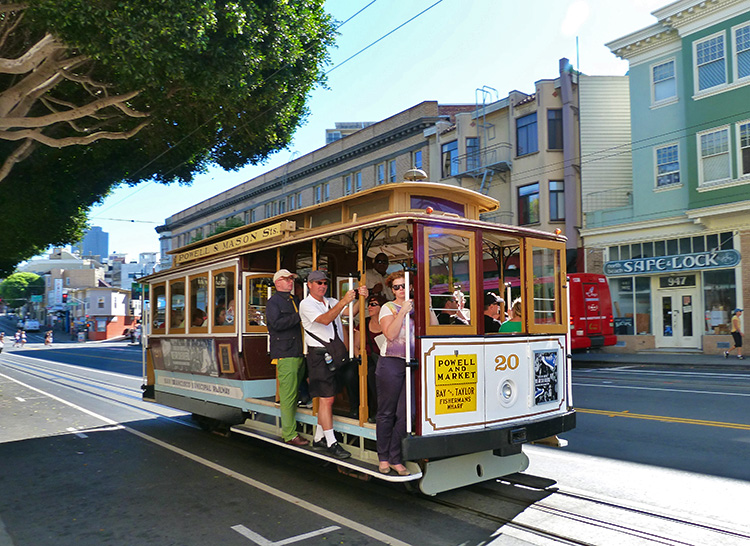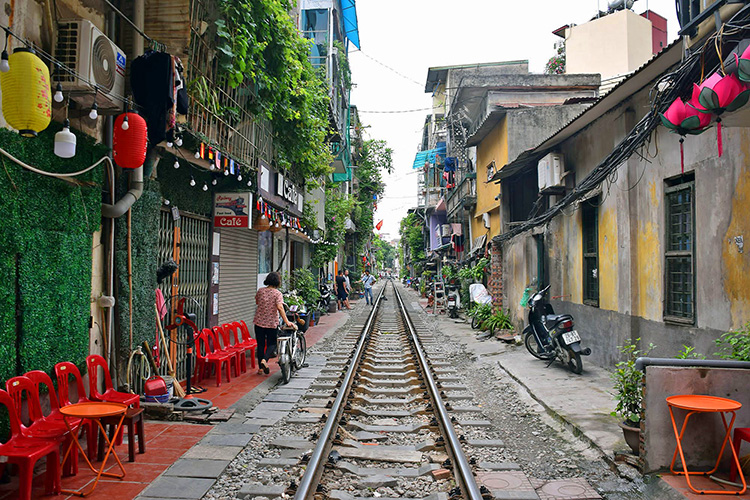Top 10 ways to stay safe and save money when travelling
[Back to other travel advice]
Before setting off on your next travel adventure, there are some sensible precautions and smart strategies you can use to help ensure that your safety is protected and that you’re not unnecessarily overpaying for goods and services while you’re away.
 San Francisco Cable Car
San Francisco Cable Car These following snippets of advice come from years of travel experience from those who have learned the hard way, having their wallets emptied, their emails hacked, and their luggage stolen! So don’t let these things happen to you. Many of the below precautions, even the Virtual Private Network (VPN) apps for your phone or laptop are completely free for travellers so there’s no reason not to plan ahead.
First of all, a few basic personal and financial safety tips:
1.Research your destination before you arrive.
It sounds bizarre, but there are people who simply throw caution to the wind, decide to go backpacking across Asia, throw a few possessions in a rucksack and go off into the great wide open.
That might be OK for the ‘romance of the road’ where you just go with the flow – but having a plan and being forearmed with pre-knowledge is much more sensible, especially if you don’t want to end up hungover in a roadside ditch somewhere, penniless and with your passport stolen!
Before setting out, use the internet and good old-fashioned guidebooks to learn about local laws and customs. For example, the laws on cannabis smoking in Vietnam are hazy – in theory heavy fines and prison time can be imposed on weed smokers; yet there are bars where the cops turn a blind eye when tourists are involved.
But whatever you do, don’t walk down the street smoking a joint – such a flagrant transgression will definitely land you at least a $100 fine and a possible exclusion from future visits to the country.
2. Respect cultural norms
Locals in some countries find it disrespectful for tourists to go into cultural buildings wearing short trousers, or worse, bare chested - irrespective of your gender! Entering a temple or mosque in just a pair of swimming trunks or a bikini is a definite no-no.
Simply carrying a small rucksack containing a light pair of long trousers, a headscarf and a top that covers your arms can save any embarrassment and you can change back into your holiday skimpies as soon as you get near a beach bar.
Also, when eating out in the evenings, many good restaurants will insist on the ‘no shorts’ rule. Indeed, if you take a trip on the famous Orient Express you’ll not even be able to wear denim jeans!
 Avoid unsafe neighborhoods
Avoid unsafe neighborhoods 3. Avoid the wrong side of the tracks
Again, researching in advance can prepare you not to go into certain neighbourhoods, wherever you go, be that Europe or Asia, wherever. A good example of this is Marseille, where the streets are perfectly safe in populous areas full of shops, but taking a wrong turn into some run-down residential suburbs could cost you dearly – muggings are rife in poorer areas of cities the world over.
And if you are going to go ‘off grid’ - make sure that you have at least one or two fellow travellers with you - there’s safety in numbers after all.
4. Be prepared with paperwork
Before leaving home, photocopy your passport, any visas, travel insurance, and other important documents. Wherever possible, keep copies physically in a different place to the originals.
Also photograph those documents and keep one copy on your phone and another in cloud storage. In that case, even if everything you’re carrying is stolen, you can still get onto a computer somewhere and download crucial paperwork if required. Just ensure that you have properly memorised the password to your iCloud or Google Drive account.
5. Taxis, Ubers and tuk-tuks
Whenever taking any sort of transportation anywhere, always, wherever possible, book it in advance on an internationally recognized phone app. Or if you hail a cab, ensure it has a proper licence. One way to create the sense that you’re street-wise is to conspicuously take a photo of the driver’s cab licence that should be displayed clearly in the taxi interior.
If some dishonest or bogus cabbie or tuk-tuk driver knows you have a photo of who they are (or claim to be) then they’re less likely to attempt any dishonest or criminal acts.
6. Save money and protect your data with a VPN
A VPN can keep your phone or laptop safe , especially when using unsecured Wi-Fi hotspots in bars or shopping malls. The server networks used by VPN providers have state of the art malware detection – so if you unwittingly log on to a hackers network, thinking that you are surfing via the hotel Wi-Fi, the VPN server will disconnect your device from the suspect connection before any virus protection even gets a chance to kick in.
Additionally, if you book hotels and flights before you leave home, using a VPN to make your device appear that you are already in the host country saves money by avoiding dynamic pricing algorithms and allowing you to pay in the destination’s currency. Accommodation and flight resellers make a fortune by applying usurious exchange rates when taking payments.
For example, if you are in the USA and book a hotel in Morocco, the website you’re using might charge you, say, 12 cents for one Moroccan Dirham, whereas your own credit card company might convert it at 11 cents. That’s ten percent saved on every purchase right there.
7. Use local SIM cards.
Simply purchasing a ‘pay as you go’ (PAYG) sim on arrival at your destination can save on expensive data roaming charges on mobile devices. If using local 4G data and / or reputable Wi-Fi, use Whatsapp to make calls as these are charged at data rates not international phone rates.
8. Eat where the locals eat.
Eating at local restaurants full of local people is sensible for two reasons: firstly, if the place is full of locals the food must be safe and tasty, otherwise the knowledgeable inherent population would not eat there.
9. Be cautious of drinking water
Just because the locals can drink the tap water wherever you’re visiting doesn’t mean that tourists can. While local tap water almost certainly won’t be poisonous, it can contain very different levels of minerals that visitors’ tummies can’t suddenly tolerate.
The result can be a vacation spent half on the toilet in your hotel or in a bar somewhere. If in doubt, drink bottled water with a sealed cap at the point of purchase.
10. Be respectful when taking photographs.
It might be fascinating to photograph some poor local beggar squatting on a street corner to grab an image like the sort of thing you might see on the cover of National Geographic Magazine.
But remember that everyone deserves human dignity. If you are going to take that pithy picture to put into your portfolio – drop the person some food or money and always ASK if it’s OK to take a photo. If they refuse, walk on – and show respect.
Likewise, photographing street vendors and market stall holders can be unwise. Some of these people might not appreciate being treated like animals in a zoo! But if you buy something and ask politely to take a picture of the stall and its owner, you’re much more likely to get a smile of assent.
In summary
Using a combination of technology, common sense and respectfulness wherever you travel will get you a long way and result in your vacation being more enjoyable and quite possibly cheaper than if you just go completely unprepared.
Above all though – there’s an old saying “regret the things you did in life, not the things that you didn’t.”
So if you’re in any doubt, take basic precautions and get that trip booked right now – you only live once after all.
More ...
- Travel Hacks — tips to save you money and minimize some of the risks associated with traveling and make travelling more enjoyable.
- Planning international travel — A Top-10 list of things to consider when planning an international holiday.
Do you have feedback, a comment or correction? Let us know
